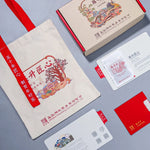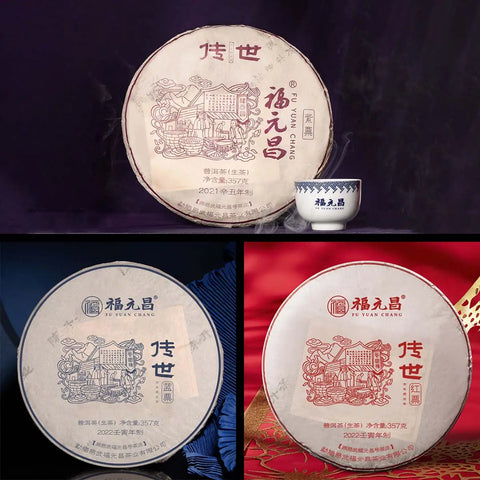Discover The Most Expensive Aged Tea and The Story Behind
Did you know the world's most expensive aged tea comes from FuYuanChang (福元昌), a legend ancient tea brand from Yiwu mountain?
In 2013, seven cakes of FuYuanChang Blue Ticket Round Tea (福元昌蓝票圆茶) from the early 20th century sold for an incredible 10.35 million yuan (USD $1.46 million) at the Beijing Jiade Auction Autumn Session. This had broken the record to become the most expensive aged tea at that time.
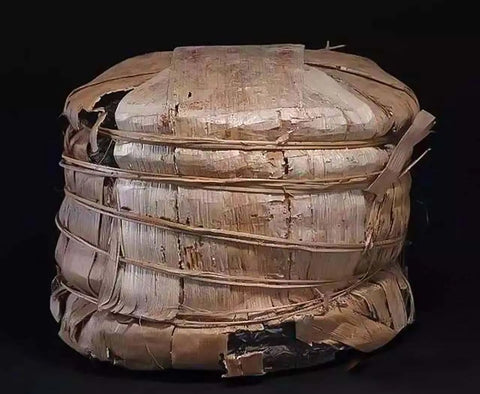
Bestsellers
(FuYuanChang Blue Ticket Round Tea 福元昌蓝票圆茶)
Don’t miss out on our authentic Pu Erh Tea collections!
In 2019, 2235 grams of FuYuanChang's Purple Ticket Aged Pu'er tea (福元昌紫票老茶) from 1920 fetched 23.11 million RMB (USD $3.36 million) at the Tokyo Chuo Auction in Hong Kong, setting a new record as the "most expensive Pu'er tea king"
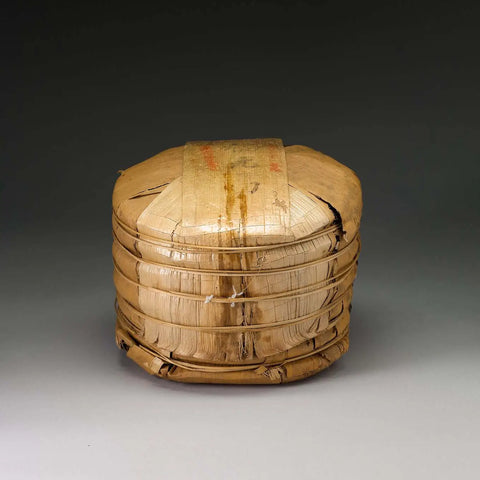
(FuYuanChang's Purple Ticket Aged Pu'er tea 福元昌紫票老茶 )
The inner tickets of FuYuanChang Pu'er tea are divided into three types: blue, purple, and white, all of which are hand-stamped with cinnabar red seals. The blue and purple inner tickets belong to more strong tea varieties, while the white inner tickets represent more gentle teas. Both types of tea have their own unique characteristics.
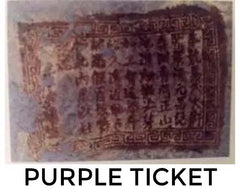
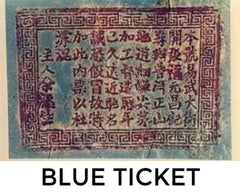
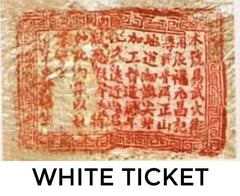
The Rise of Yiwu: A Legendary Place in the History of Pu'er Tea
When it comes to the history of Pu'er tea, Yiwu is an indispensable part. From the mid-Qing Dynasty to the early years of the Republic of China, the Pu'er tea market flourished unprecedentedly, and Yiwu gradually developed into one of the important trading centers. From the end of the Guangxu era in the Qing Dynasty to the 26th year of the Republic of China (1937), Yiwu's tea industry reached its peak.
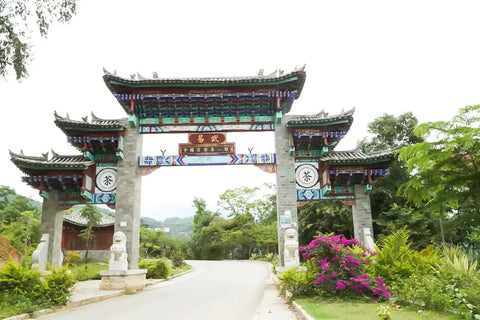
During the Qing Dynasty (1644-1912), the ancient Six Major Tea Mountains (古六大茶山), Yiwu/Mansa (易武/慢撒), Yibang (倚邦), Mangzhi (蛮砖), Gedeng (革登), Mangzhuan (莽枝), and Youle (攸乐), became the material procurement sites for the royal tribute tea—Pu'er tea. Every spring, local officials responsible for collecting tribute tea would pick the best leaves, process them, and then transport them to the capital via the Tea Horse Ancient Road (茶马古道), contributing to the development of the tea industry in the Xishuangbanna region.
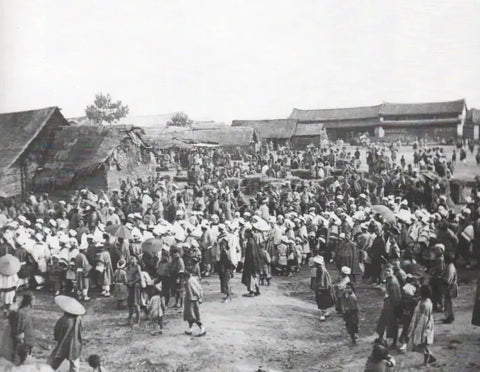
Yiwu emerged last among the Six Major Tea Mountains, but with its high-quality tea leaves and convenient transportation, it gradually became an important tea trading center. Yiwu's large-leaf Pu'er tea quickly became a royal tribute, replacing small-leaf tribute teas from Mansong (曼松), Yibang (倚邦), and other places. By the Guangxu era, Yiwu had become the largest tea processing and export base and domestic and foreign commodity circulation center among the Six Great Tea Mountains, with "Yuan Chang Hao" (元昌号) being one of the largest Pu'er tea houses at the time.
Lao Ban Zhang
About YuanChangHao (元昌号)
YuanChangHao was established in the first year of the Guangxu era (1875) and located on Yibang Street (倚邦大街). It was the predecessor of FuYuanChang Hao (福元昌号). However, at the end of the Guangxu era (1908), due to the worsening security situation and the prevalence of diseases in southern Yunnan, almost all tea houses and factories ceased production, including YuanChangHao.
The Establishment of FuYuanChang
Yu Fusheng (余福生), the founder of FuYuanChang, took over and purchased YuanChangHao in the early years of the Republic of China, and change the brand name to FuYuanChang. FuYuanChang Tea House resumed operations on Yiwu Street in 1921, and with their dedication to tea quality and diligent management, they once again reached their peak in 1929, and became the "Top Three Tea Houses of Yiwu" at that time.
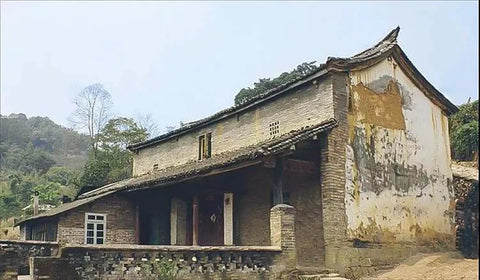
(FuYuanChang Original Tea House)
As the Anti-Japanese War (1931-1945) broke out, the ancient Tea Horse Road became obstructed, causing the tea business to plummet. Many tea merchants were forced to close, bringing tea production in Yiwu to a standstill. Life pressures increased, and Yu Fusheng and his wife passed away in 1945 and 1946, following the war's victory. After the liberation, all tea brands were nationalized for various reasons, causing FuYuanChang's glory to fade gradually.
On April 12, 1970, a fire broke out on Yiwu Main Street. Although Yu's house was not affected, he sold his ancestral home to another person and moved out of Yiwu with other affected members. Since then, no one in the Yu family has been involved in the tea business.
It wasn't until 2006 when Chen Shenghe acquired FuYuanChang's original site that the century-old brand's cultural heritage could continue.
The Inheritance Journey of Chen Sheng Hao and FuYuanChang
In 2006, Chen Shenghe, in his 50s, began a journey to explore the Pu'er tea in Yunnan. While visiting various tea mountains and tea gardens in Yunnan, he discovered the nearly declining Fu Yuan Chang old tea house in Yi Wu and was deeply touched. Chen Shenghe decided to search everywhere for information about FuYuanChang and successfully acquired the century-old "FuYuanChang" original location. After much effort, he finally found the grandson of the founder of Fu Yuan Chang, Yu Zhichang (余智畅).
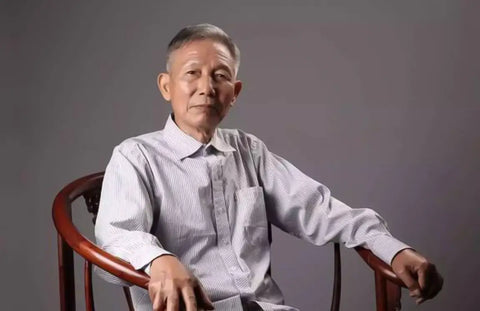
(Yu Zhichang)
In 2008, Mr. Chen Shenghe and Mr.Yu Zhichang met for the first time. Mr. Yu shared many of his father's memories about FuYuanChang, which produced tea using the finest early spring materials from the ancient Six Major Tea Mountains. The founder as well as his grandpa, Yu Fusheng, had mastered the receipt and tea making process, giving the tea a unique charm and strong character.
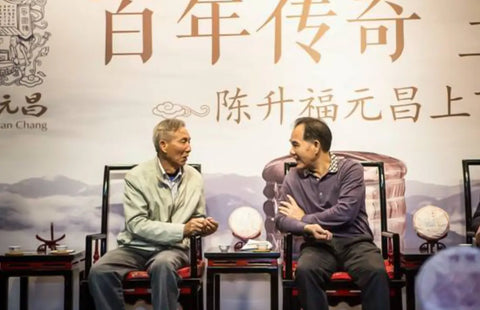
(Yu Zhichang: Left, Chen Shenghe: Right )
After a long conversation, Chen learned that the historical heritage of the old brand FuYuanChang still existed, and these two people realized that they shared the same dream of recreating the taste of FuYuanChang and revitalizing the brand. They decided to revitalize FuYuanChang together.
ChenShengHao invited Mr. Yu to serve as the honorary consultant for "ChenSheng FuYuanChang" (陈升福元昌). The two repeatedly discussed the craftsmanship and researched methods to reproduce the taste of FuYuanChang. Chen funded the construction of roads in Yiwu and restored FuYuanChang's original house to honor his commitment to the Yu family.
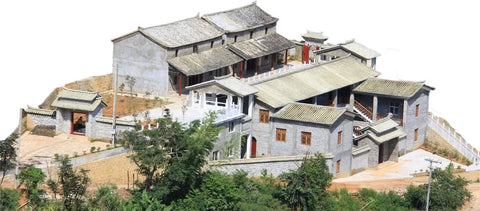
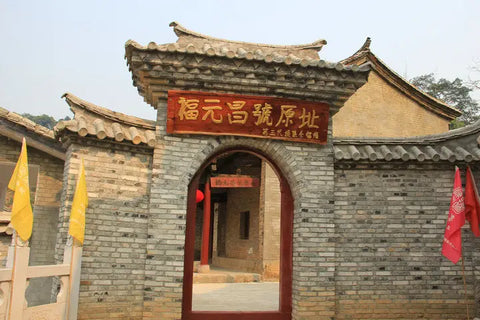
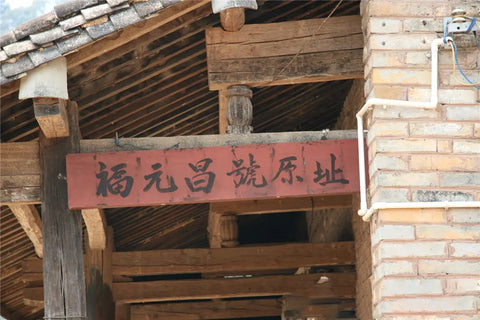
Yu collected information about tea-making techniques from his father who has learned about tea-making techniques from his father since childhood and has developed a clear understanding of the entire process. Thankfully, Yu publicly announced that he had passed on this secret information to Chen as proof of inheritance.
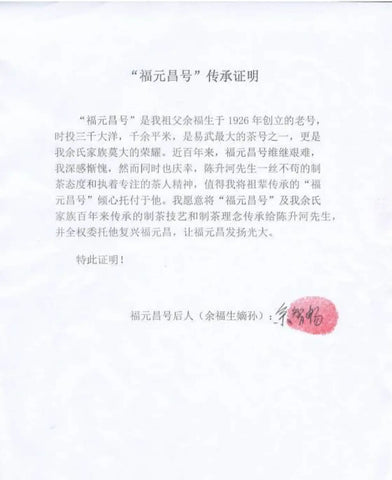
(Proof of inheritance from Yu Zhichang)
Chasing the taste of FuYuanChang, Chen dedicated years to exploring Yunnan's tea mountains across various regions and journeying into remote areas to study the unique qualities of tea leaves from each region. He has repeatedly sorted and tested the ancient tree tea material system of the Six Major Tea Mountains, and discussed with Mr. Yu to explore the process.
In addition, Chen also invited tea experts to sample and analyze a cake of fortunately preserved FuYuanChang aged Yuan Cha for researching. However, the early versions of recreated tea still had some differences in taste compared to the original. Chen persisted and continuously consumed two barrels (14 cakes) of the legendary tea, which worth over 20 million yuan based on 2013 auction prices, as part of their efforts to optimize the receipt.
After nearly a decade of research and experimentation, they made significant progress in replicating the original taste of the tea. Mr. Chen Shenghe confidently stated that he has found the secret to recreate the taste of the past. They have the same excellent quality of materials, plus nearly a century of tea aging. Their tea will become even better after being refined by time.
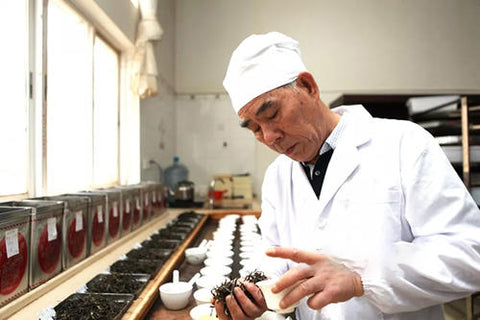
In 2015, Mr. Chen Shenghe officially established a Yiwu Pu’er tea brand of "ChenSheng FuYuanChang" (陈升福元昌), and launched the “Chuan Shi” series of products, replicating the taste of FuYuanChang.
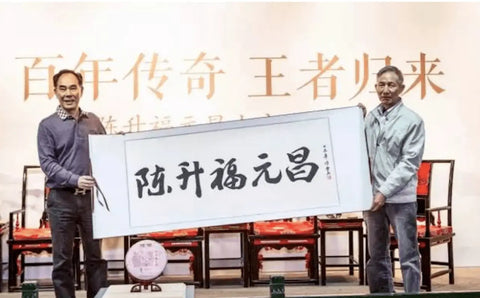
Chen Shenghe (Left), Yu Zhichang (Right)
(“Chuan Shi" Collection of ChenSheng FuYuanChang)
The Yi Wu series Pu'er tea of Chen Sheng Hao began in 2006, and the base of Yi Wu has been in production for more than ten years. In 2009, Chen Sheng Hao launched the "FuYuanChang" (复原昌) series Yiwu Pu'er tea, which is a homophonic reference to the century-old Yiwu brand "FuYuanChang (福元昌)." Literally, it means the restoration of FuYuanChang, paying tribute to and carrying on the heritage of the legendary brand. Although the name has changed several times, but the taste remains consistent, dedicated to bringing the purest Yi Wu taste to tea lovers worldwide.
Sources:
https://www.chayu.com/article/129186
https://www.sohu.com/a/407214708_662707
http://www.puerp.com/article-16331.htm
https://www.jiemian.com/article/1042843.html
https://baijiahao.baidu.com/s?id=1644733693934165343&wfr=spider&for=pc
http://www.360doc.com/content/16/0310/00/31212678_540914114.shtml
https://www.sohu.com/a/516832917_563023
https://xueqiu.com/1333325987/164440302
https://www.chayu.com/article/195281
← Older post Newer post →

